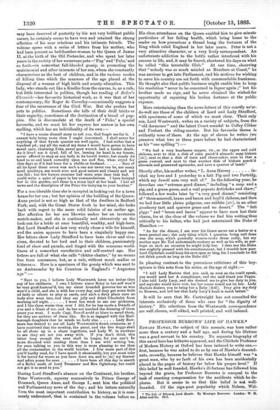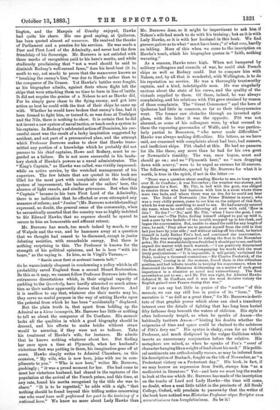PROFESSOR BURROWS' LIFE OF HAWKE.*
EDWARD HAWKE, the subject of this memoir, was born rather more than a century and a half ago, and during his lifetime was a good servant to his country. No separate biography of this naval hero has hitherto appeared, and the Michele Professor of Modern History at Oxford has been induced to write one,— first, because he was asked to do so by one of Hawke's descend- ants, secondly, because he believes that Hawke himself was "a great man, who by no fault of his own has been accidentally placed in the pages of history far below his proper level." If this belief be well founded, Hawke's ill-fortune has followed him beyond the grave, for Professor Burrows is unequal to the task of exacting compensation for the accidents which he de- plores. But it seems to us that this belief is not well- founded. Of the sign-post popularity which Nelson, Wel- • The Life of Edward, Lord Hawke. By Montagu Barrows. Leaden: W. H. Allen and Co. 1E1:3. lington, and the Marquis of Granby enjoyed, Hawke had quite his share. His one good saying, at Quiberon, has been quoted almost ad nauseam. He received the thanks of Parliament and a pension for his services. He was made a Peer and First Lord of the Admiralty, and never lost the firm friendship of his Sovereign. Mr. Burrows is not satisfied with these marks of recognition paid to his hero's merits, and while studiously proclaiming that "not a word should be said to diminish Rodney's well-earned fame," does his level-best (it is, Booth to say, not much) to prove that the manceuvre known as -" breaking the enemy's line," was due to Hawke rather than to the conqueror of De Grasse. Yet Hawke's battles were fought, as his biographer admits, against fleets whose flight left the ships that were attacking them no time to form in line of battle. It did not require the genius of a Nelson to act as Hawke did, For he simply gave chase to the flying enemy, and got into action as best he could with the first of their ships he came up with. Whether he would have broken that enemy's line, had it been formed to fight him, or turned it, as was done at Trafalgar and the Nile, there is nothing to show. It is certain that he did not invent a new system of naval tactics, or teach such a system to his captains. In Rodney's celebrated action off Dominica, his suc- cessful onset was the result of a lucky inspiration suggested by accident, and not part of a preconceived plan, and the attempt which Professor Burrows makes to show that Hawke trans- mitted any portion of a knowledge which he probably did not possess to his chief captains, Howe and Rodney, must be re- garded as a failure. He is not more successful in his lauda- tory sketch of Hawke's powers as a naval administrator. The "King's Captain," as Hawke was called, was vividly impressed, while on active service, by the wretched management of his superiors. The few letters that are quoted in this book are filled for the most part with complaints about the shocking system of impressment, the badness of the sailors' beer, the absence of light vessels, and similar grievances. But when this " Captain " became in his turn First Lord of the Admiralty, there is no- indication that he effected or even attempted any measure of reform; and "Junius" (Mr. Burrows notwithstanding) expressed, no doubt, the general sense of the community, when he sarcastically asserted that the country was so highly indebted to Sir Edward Hawke, that no expense should be spared to secure to him an honourable and affluent retreat.
Mr. Burrows has much, too much indeed by much, to say of Walpole and the war, and he hammers away at a question that we thought had ceased to be discussed, except in junior debating societies, with remarkable energy. But there is nothing surprising in this. The Professor is known for the strength of his political opinions, and he is here "with his bears," as the saying is. In him, as in Virgil's Tarim,— " Saevit amor fern i et scelerati insania belli."
So he waxes irately eloquent in condemning a policy which in all probability saved England from a second Stuart Restoration. Be this as it may, we cannot follow Professor Burrows into those extraneous dissertations which, in their original capacity of padding to the Quarterly, have hardly attracted so much atten- tion as their author apparently deems that they deserve. And it is needless to say that, whatever else their merits may be, they serve no useful purpose in the way of setting Hawke upon the pedestal from which he has been " accidentally " displaced.
But the plain truth is, that apart from holding up the Admiral as a lteroe incompris, Mr. Barrows has little or nothing to tell us about the conqueror of De Conflans. His memoir lacks all the qualities in which a good biography should be dressed, and his efforts to make bricks without straw would be amusing, if they were not so tedious. Take his treatment of Hawke's wife, for instance. He admits that he knows nothing whatever about her. But finding her once upon a time at Plymouth, when her husband's victorious fleet was putting in there, his imagination goes off at score. Hawke simply writes to Admiral Chambers, on this occasion, " My wife, who is now here, joins with me in com- pliments to you." "Who is now here," writes Mr. Burrows, gushingly ; "it-was a proud moment for her. She had come to meet her victorious husband, had shared in the raptures of the po. pulation at the arrival of the French prizes, and this time, at any rate, found his merits recognised by the title she was to share." "It is to be regretted," he adds with a sigh, "that nothing should be found beyond this trifling notice concerning one who must have well performed her part in the training of a _national hero." We know no more about Lady Hawke than Mr. Burrows does, so it might be impertinent to ask him if Nelson's wife had much to do with his training ; but as it is with Lady Hawke, so it is with her husband in this book. We find guesses galore as to what" mast have been ;" of what was, hardly an inkling. More of this when we come to the inscription on Hawke's tomb, which his biographer quotes in" faith, nothing
wavering."
As a seaman, Hawke rates high. When not hampered by military colleagues and councils of war, he could sink French ships as well as Rodney could. But to compare him with Nelson, and, by all that is wonderful, with Wellington, is to do his reputation no service. He was a thoroughly trustworthy captain, and a kind, indefatigable man. He was singularly anxious about the state of his crews, and the quality of the victuals supplied to them. Of these, indeed, he was always complaining, and his relations with Pitt grew strained by reason of those complaints. The "Great Commoner" and the hero of Quiberon had little in common, so far as their idiosyncracies went. The former saw obstacles through an inverted optic glass, with the latter it was the opposite. Pitt was not alarmed, as some of his colleagues were, by what seemed to them the vapouring gasconades of Wolfe, and be was particu- larly partial to Boscawen, "who never made difficulties."
Hawke was always making difficulties. His letters, as we have said, are crammed with complaints about bad beer, bad seamen, and inefficient ships. Pitt chafed at this. He had no panacea for ills like these, any more than he had for his own goat or Newcastle's timidity. The war, once begun, must and should go on ; and no "Plymouth beer," no "men dropping down with scurvy," were to be urged as excuses for ill-success.
The following anecdote, quoted by Mr. Burrows for what it is worth, is true in the spirit, if not in the letter :—
"There was a question about sending Hawke to sea, to keep watch over M. de Conflans ; it was November ; the weather was stormy, and dangerous for a fleet. Mr. Pitt, in bed with the gout, was obliged to receive those who had business with him in a room where there were two beds, and where there was no fire, for he could not bear one. The Duke of Newcastle [the Prime Minister in name], who was a very chilly person, came to see him on the subject of this fleet, which he was most unwilling to send to sea. He had scarcely entered the room, when he cried out, shivering all over with cold, 'How is this ? No fire ?'—' No,' said Mr. Pitt, when I have the gout, I can- not bear one.'—The Duke, finding himself obliged to put up witlf it, took a seat by the bedside of the invalid, wrapped up in his cloak, and began the conversation. But, unable to stand the cold for any length of time, be said, 'Pray allow me to protect myself from the cold in that bed you have by your side and without taking off his cloak, he buried himself in Lady Esther Pitt's bed, and continued the conversation. The Duke was strongly opposed to risking the fleet in the November gales ; Mr. Pitt was absolutely resolved that it should put to sea, and both argued the matter with much warmth.—' I am positively determined the fleet shall sail,' said Pitt, accompanying his words with the most lively gesticulations.—' It is impossible, it will perish,' exclaimed the Duke, making a thousand contortious.—Sir Charles Frederick, of the Ordnance,' coming in at the moment, found them in this ridiculous position, and had infinite trouble in keeping his countenance, when he discovered the two Ministers deliberating on a matter of such great importance in a situation so novel and extraordinary. The fleet nevertheless put to sea ; ani Mr. Pitt was right, for Admiral Hawke defeated N. de Conflans, and it was the most decisive victory the Eoglish gained over France during that war."
If we can say but little in praise of the " matter " of this memoir, we can say still less in praise of its "form." The narrative is "as dull as a great thaw," for Mr. Burrows is desti- tute of that graphic power which alone can shed a transitory interest over the details of fighting that has long been buried fifty fathoms deep beneath the waters of oblivion. His style is often ludicrously turgid, as when he speaks of Anson—the habitually taciturn Anson—" hinting his doubts whether the exigencies of time and space could be chained to the axletrees of Pitt's fiery car." His syntax is shaky, even for an Oxford Professor, and much disfigured by the vulgar Gallicism which inserts an unnecessary conjunction before the relative. His metaphors are mixed, as when he speaks of Fox's 'want of
character hanging like a weight of lead about his neck." His politi-
cal sentiments are orthodoxically rococo, as may be inferred from his description of Rosbach, fought on the 5th of November, as "a Protestant victory on a Protestant day." His book, in fact, if
we may borrow an expression from Swift, stamps him "as a mediocrist in literature." Yet—and here we must beg the reader to look at the use which Mr. Barrows has made of the inscription on the tombs of Lord and Lady Hawke—the time will come, no doubt, when a neat little tablet in the precincts of All Souls' College, Oxford, will proclaim to passers-by that the writer of the book here noticed was Historiae Professor atque Scriptor CUM accuratissintus turn locupletissimus. So be it!



































 Previous page
Previous page